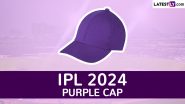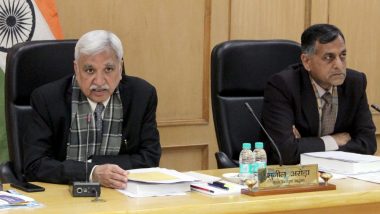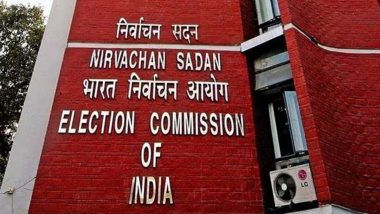New Delhi, May 21: Election Commissioner Ashok Lavasa, who had opposed clean chit given to Prime Minister Narendra Modi and BJP chief Amit Shah on charges of violating the Model Code of Conduct (MCC), said it was Supreme Court's rebuke to the Election Commission's delayed reaction to hate speeches that prompted him to question the poll panel's handling of MCC complaints.
On April 15, the Supreme Court pulled up the Election Commission for failing to take action against politicians who make hate speeches and violate the MCC. Following the apex court's reprimand, the same day, the poll panel issued orders temporarily banning BSP chief Mayawati, SP leader Azam Khan, UP Chief Minister Yogi Adityanath and Union Minister Maneka Gandhi from campaigning for their communal remarks.
Three days later, Ashok Lavasa moved a note on strengthening and streamlining procedures of dealing with MCC complaints. "On April 15, Hon’ble Supreme Court had made certain observations and the number of undisposed matters were pending had accumulated. I wrote the note because I felt there was a need to systematise disposal of (MCC) complaints," Lavasa told The Indian Express on being asked what prompted him to write the note.
On May 16, Lavasa wrote a letter to Chief Election Commissioner (CEC) Sunil Arora and recused himself from meetings on MCC violations in protest over inaction on his suggestions. Lavasa, in his letter, also insisted that he would attend the meetings if his minority decisions were also included in the orders of the Election Commission. Congress Demands Inquiry into Issues Raised by Ashok Lavasa, Accuses Narendra Modi Govt of Pressuring EC.
Lavasa had, on five occasions, opposed clean chits given to PM Narendra Modi and Amit Shah on charges of violating the MCC during their campaign for the Lok Sabha elections. “If decisions of the Election Commission are taken by majority and you do not include the minority view (in the final order) then what is the point of a minority view?” the Election Commissioner was quoted as saying.
"All multi-member and statutory bodies have an established procedure of working. EC is a constitutional body and it should follow that procedure," he added. CEC Sunil Arora had denied any controversy in the internal functioning of the Election Commission, calling it "unsavoury and avoidable".
Reacting to this, Lavasa said: "All controversies are unsavoury. They seem ill-timed as they pose difficult questions that remain unattended. They can be avoided if decisions and actions affecting the people are perceived as timely, fair and non-discriminatory." The three-member "Full Commission" consists of Chief Election Commissioner Sunil Arora and two Election Commissioners, Ashok Lavasa and Sushil Chandra.
(The above story first appeared on LatestLY on May 21, 2019 08:37 AM IST. For more news and updates on politics, world, sports, entertainment and lifestyle, log on to our website latestly.com).














 Quickly
Quickly


















